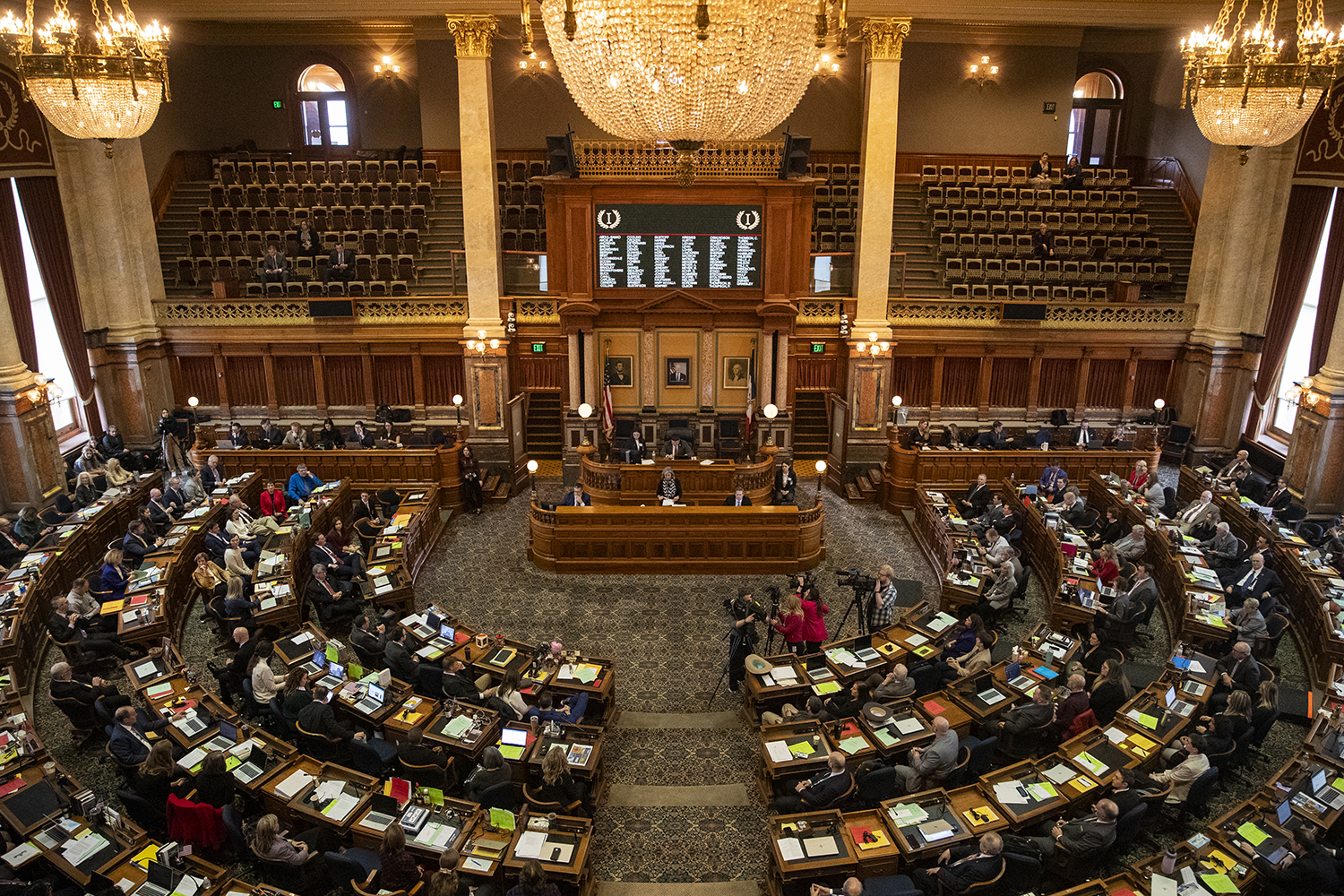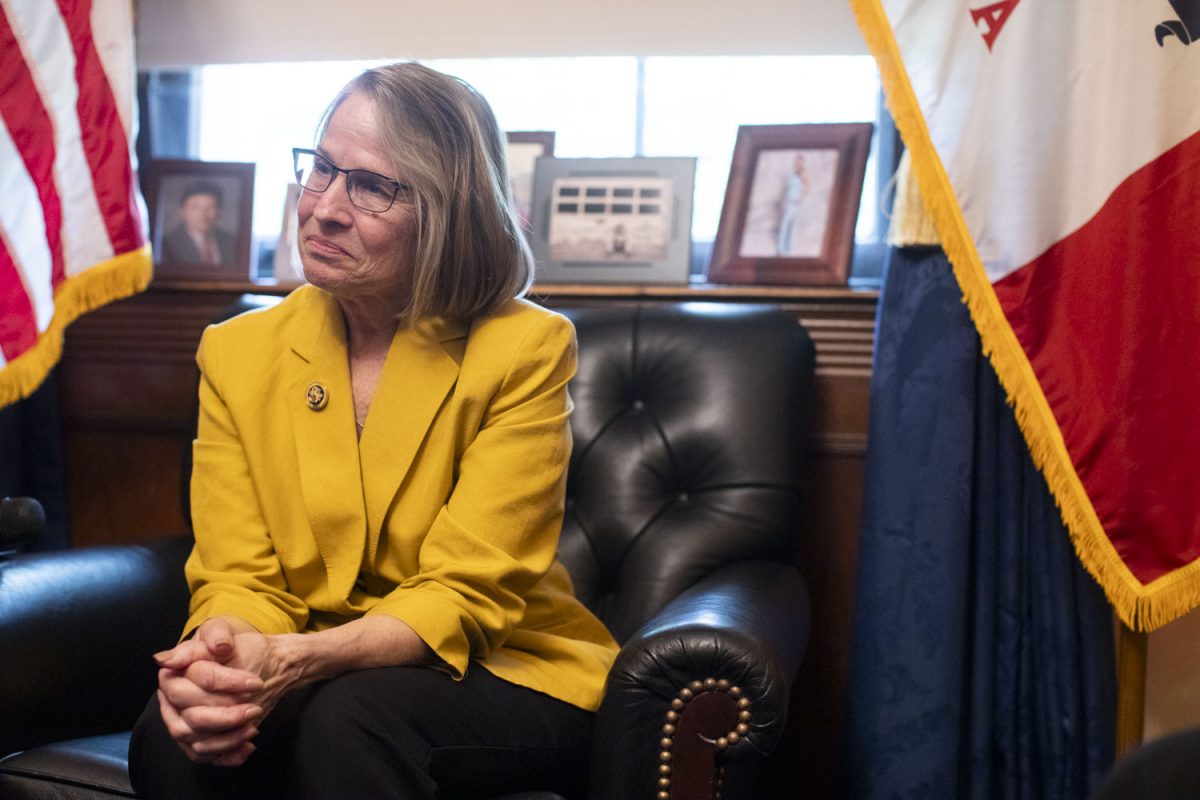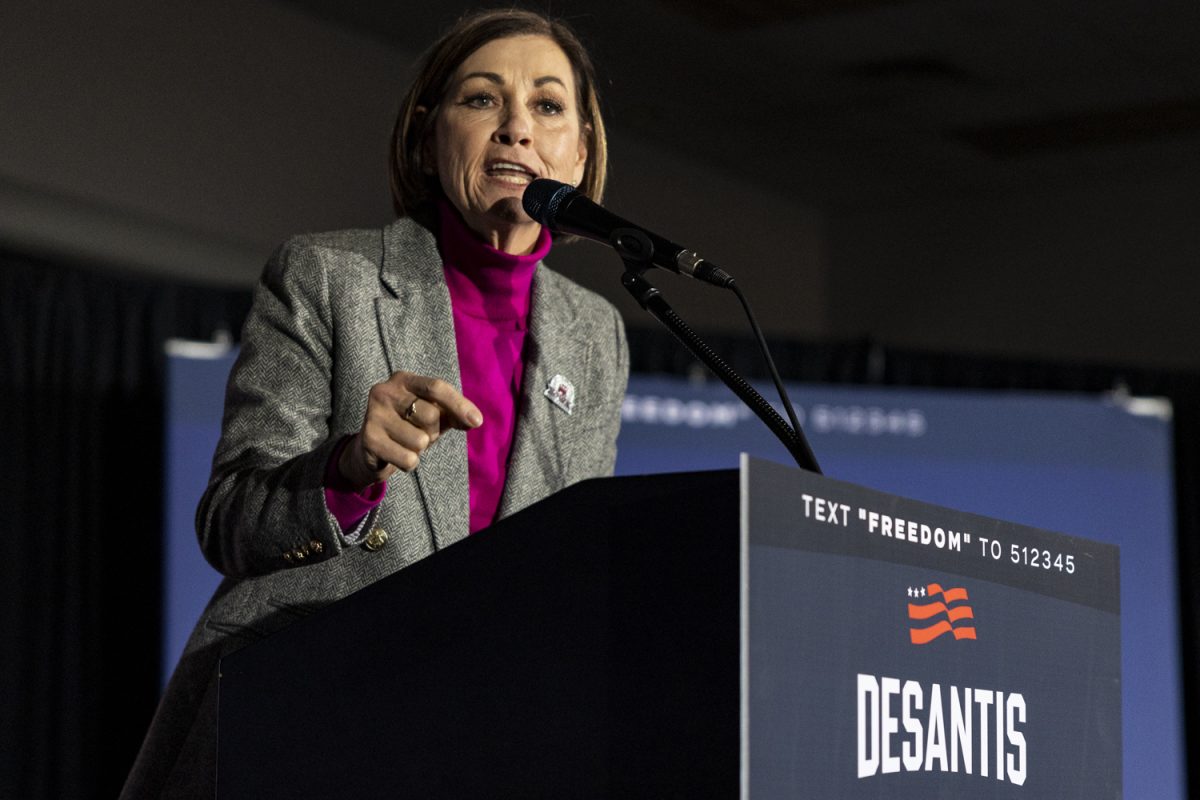Despite a desire to run for office and clear qualifications, Megan Alter questioned her place in the process when she ran for Iowa City City Council in 2019. Now a city councilor, Alter began her political career on the Iowa City Housing and Community Development Commission and credits the panel as a pipeline to a higher office.
Alter decided to run for city council because of her time serving on the commission and the skills she gained overseeing policies related to the city’s provision of housing, jobs, and services for low and moderate-income residents. However, Alter said she still needed to be convinced that she was qualified to run for city council.
“I have seen it time and time again, about women needing to feel qualified and way overqualified in comparison to some other people,” Alter said. “It does take women more nudging, and I had a lot of really, really good supportive people who were like, ‘You would be really good at this, go for it.’ But there was a lot of like, ‘What am I doing?’”
Iowa Gov. Kim Reynolds signed Senate File 2096 into law in April, which repealed the requirement that Iowa’s boards and commissions have a balanced number of men and women. Alter is one of the thousands of women who are now ever-present in Iowa politics and government after the state in 1987 became one of the first to enact a law requiring state and local boards and commissions to have a balance of men and women.
Experts fear these recent gains will be lost and suggest a new law will result in fewer women participating in state and local government.
While at her job as a senior manager at ACT in 2017, Alter attended a presentation by 50-50 in 2020 — a bipartisan group of Iowa women aiming to have 50 percent of seats in the state legislature inhabited by women by 2020. Alter said she was struck by the group’s message, which gave her the “spark” to run for city council.
In her first run for an at-large seat on the Iowa City City Council in 2019, Alter lost to Janice Weiner and Laura Bergus. Two years later, Alter ran again and won, and has served on the city council since 2021.
Women hold power in the highest echelons of state government, from Reynolds becoming the first female governor in 2017 to Rita Hart taking the helm of the Iowa Democratic Party in 2023. Republicans say the requirement is no longer necessary with women saturating the state’s leadership roles, but Democrats say the law is imperative to ensuring women have a seat at the table.
After expanding the gender balance requirement to local boards in 2009, gender balance skyrocketed on city and county boards and commissions. According to data from Iowa State University’s Carrie Chapman Catt Center for Women in Politics, the percentage of women serving in cities rose from 13 percent to 61 percent and from 12 percent to 62 percent in Iowa counties.
Before the repeal, Iowa was one of nine states to have legislation requiring or encouraging gender balance on state and local boards and commissions. Many of these statutes are being targeted in the courts.
Research indicates a legislator’s gender influences their policy priorities. Evidence from the research shows that as more women are elected to office, there is an increase in policy that reflects the priorities of families, women, and ethnic and racial minorities, and an emphasis on quality of life.
Iowa court rules law unconstitutional
Iowa lawmakers’ repeal of the law followed a January ruling that stated requiring gender balance on the State Judicial Nominating Commission was unconstitutional.
A lawsuit filed by California-based Pacific Legal Foundation on behalf of former state legislator Charles Hurley challenged the gender balance requirement on the panel, which makes recommendations to the governor for judges to serve on Iowa’s appellate courts. The organization argued enforcing gender balance was unconstitutional and in violation of the equal protection clause of the 14th Amendment to the U.S. Constitution.
U.S. District Judge Stephanie Rose, chief judge for the Southern District of Iowa, issued her ruling against the state on Jan. 11, which immediately blocked enforcement of the law.
“This is not to say that gender discrimination does not exist — it plainly does across the spectrum of jobs in this country — but the evidence presented to the court does not establish this fact in this commission, in this state, in this time,” Rose wrote in her ruling.
The Pacific Legal Foundation — a national firm focusing on government overreach — has brought forth similar cases in Arkansas, Tennessee, Alabama, and Louisiana.
When signing the repeal into law on April 3, Reynolds was joined by Hurley and the attorneys who represented him. The firm continues to pursue removing gender-balance laws across the U.S.
Terese Grant, co-president of the Iowa League of Women Voters, said the repeal of the gender balance requirement was not a shock because of the ruling that the law was unconstitutional.
“Once I heard that, I thought gender balance was going to be gone,” Grant said. “It was just very, very, very disappointing that [the repeal] also happened in Iowa.”
Women lead Iowa politics
Proponents of the repeal argue it is no longer necessary, as women are already leading Iowa politics.
Iowa is led by a female governor and attorney general, and both chambers have women in the leadership ranks with House Democrats led entirely by women.
Replacing former Iowa Gov. Terry Branstad, Reynolds became the first woman to serve as governor of Iowa in 2017. In midterm elections the following year, Reynolds won to become Iowa’s first elected female governor.
The repeal is part of Reynolds’ broader changes to Iowa’s system of boards and commissions, which she announced as a legislative priority during her Condition of the State Address in January. Iowa lawmakers recently approved a bill that would eliminate 67 of Iowa’s 256 boards and commissions. The bill is awaiting final approval from Reynolds.
“I believe that our focus should always be on appointing the most qualified people,” Reynolds said in an April 3 news release. “That includes engaged citizens with a genuine interest in serving their state or local community, as well as individuals with valuable experience that directly relates to the position. This approach ensures that boards and commissions at all levels of government are effective and that each one serves Iowans well. That’s exactly what this bill aims to accomplish.”
When asking for comment, The Daily Iowan was pointed to Reynolds’ past statements.
Sen. Annette Sweeney, R-Buckeye, voted against extending the gender balance requirement to local boards and commissions in 2009 and voted in February to repeal the law.
“I look at it as empowering women because we are not getting a position on the board and commission just because of our gender,” Sweeney said. “We are going to get the position for a particular board because of our merits.”
Sweeney said the repeal will not affect women’s presence in politics, as there are no gender-balance requirements in politics or running for office, and women are starting to be more involved in the political scene.
In cities with a population over 10,000, Iowa ranks 39 out of all 50 states for women holding office in a local governing body in 2024, according to data from the Center for American Women and Politics. In Iowa, 28.9 percent of municipal officeholders are women.
With women making up only 29.3 percent of the Iowa Legislature in 2024, the state ranks 35th in the nation for the percentage of women holding a seat in state legislatures, according to the center.
Upon the election of U.S. Sen. Joni Ernst, R-Iowa, in 2014, Iowa was the second-to-last state in the nation to elect a woman to Congress.
Since then, the number of women representing Iowa on the federal delegation has picked up. Today, half of Iowa’s four members of Congress are women.
Democrats: repeal comes too soon
Some Democrats say the repeal of the law will hamper women’s progress in politics.
House Democratic Leader Jennifer Konfrst, D-Windsor Heights, is the first woman to lead the chamber’s Democrats after the House Democratic caucus elected her to the position in 2021. Now, House Democrats host an entirely female leadership team.
Konfrst got her start in government on a commission. In the early 2000s, Konfrst served on a county consolidation commission tasked with deciding whether to combine Polk County and Des Moines governments. She said the commission gave her the chance to glimpse into government work.
“Women really get their feet wet in the government process on those boards and commissions,” Konfrst said. “Now, I think women are ready to run for office right now and don’t need that experience, but it serves oftentimes for women to help get more comfortable with the process.”
Konfrst said women deserve a voice at the table, especially in Iowa’s boards and commissions. Republicans also cited difficulties that some boards and commissions have with obtaining gender balance. State law allows appointing officials to fill a seat after giving a good faith attempt to obtain a gender balance for three months.
“Women’s voices deserve to have equal access and an equal place at the table as men’s when it comes to the work that these important boards and commissions do,” Konfrst said. “So, I don’t understand why in 2024 we’re just throwing up our hands and saying, ‘I give up.’ It seems to me that we should just try harder to bring balance.”
State Sen. Sarah Trone Garriott, D-Windsor Heights, said there wasn’t a single woman among the Iowa Senate Democrats who felt like the gender-balance requirement is no longer needed and there is still a “boy’s club mentality” in politics.
“The women in my chamber told stories about women they knew and served with a long time ago who fought for those changes,” Trone Garriott said in an interview with the DI. “It felt very much like hard-won changes that people worked very hard on to make sure it happened, and it was kind of like losing their legacy, which was emotionally discouraging for a lot of women in our caucus.”
Sen. Herman Quirmbach, D-Ames, voted for the repeal of the state law. During a Feb. 20 floor debate on the bill, he said the requirement is no longer needed because women are the most qualified for the roles, so repealing the requirement would allow women-majority boards and commissions.
Experts: repeal could result in less women in government
Iowa State University’s Carrie Chapman Catt Center for Women and Politics began tracking compliance with the state’s gender-balance law in counties and some of the state’s larger municipalities since it was enacted.
The center’s Gender Balance Project collected data from nine municipal boards and commissions in 2022, reporting that 12 Iowa cities achieved gender balance on all boards and commissions studied.
The report showed women made up 42.96 percent of all reported city board and commission members, and women held 32.38 percent of all reported chair positions.
Center Director Karen Kedrowski, an ISU associate professor of political science, said Iowa’s gender-balance law was unique in the nation when it was first enacted.
Kedrowski said the law successfully increased the percentage of women serving on local boards and commissions, which placed Iowa ahead of other states, but the repeal of the law will cause a slow decrease in the number of women serving in such positions.
“We are falling behind the rest of the nation, not because women are getting elected, but because they’re not,” Kedrowski said. “The numbers of women are not increasing as quickly as they are in other states.”
The Iowa Department of Human Rights reported that women make up more than half of Iowa’s population, outnumbering men in 90 of Iowa’s 99 counties. However, the department said women have historically been underrepresented on local boards and commissions.
The department acknowledged that without some form of effort being made, Iowa’s councils, boards, and commissions may have difficulty finding women to serve.
“Women are just more reluctant and discount their own qualifications and their own achievements compared to men on average, and that contributes to the reason why you don’t see a lot of women stepping forward to run for office,” Kedrowski said. “I would wager that it’s harder to recruit women for certain boards and commissions for the same reason.”
Alter, on the Iowa City City Council, said local electees must work harder to ensure boards and commissions have representatives with a range of perspectives and experience, which includes looking for diversity in gender, background, ethnicity, and other characteristics.
“I wish we were there culturally, socially, and within our own communities where we didn’t have to worry about making sure that there was a balance,” Alter said. “We’re not in a ‘post’ anything world, and to say that we are, that we don’t need that anymore, is dangerous.”






